#5th century jewelry
Text
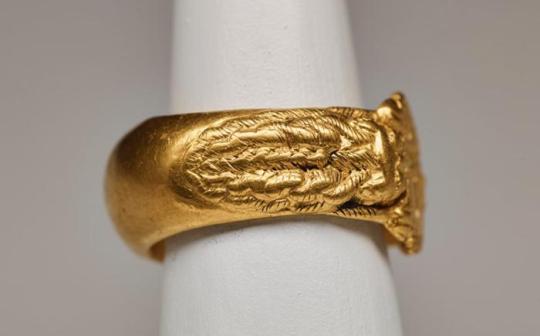
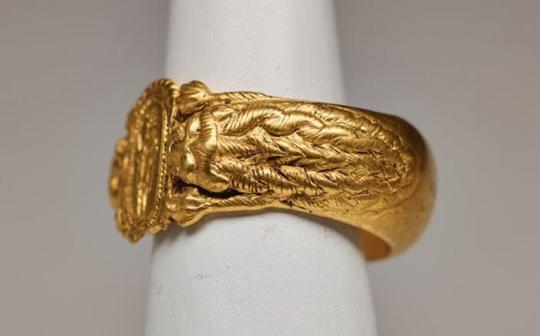
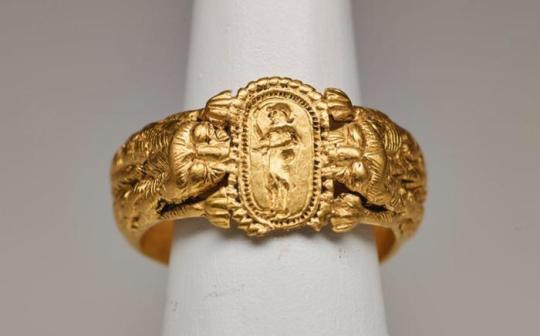
~ Lion ring.
Culture: Etruscan
Date: early 5th century B.C.
Medium: Gold
#ancient#ancient art#history#museum#archeology#ancient history#archaeology#Etruscan#ancient jewelry#jewelry#ring#gold#lion ring#lion#5th century B.C.
1K notes
·
View notes
Photo
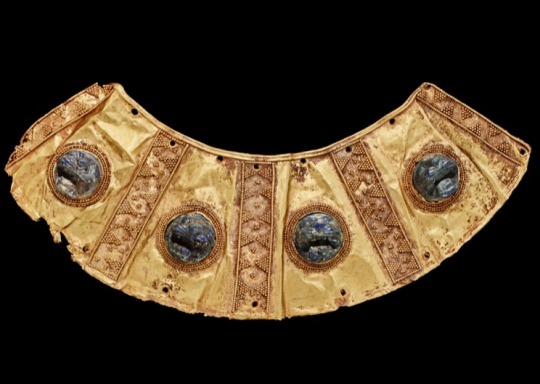

AN ACHAEMENID GOLD AND LAPIS LAZULI PECTORAL
CIRCA 5TH-4TH CENTURY B.C.
8 1⁄2 in. (21.5 cm.) long.
The pectoral is formed of hammered sheet with perforations along the edges for attachment. The crescentic arc is divided into four sections by thin columns each framed with beaded wire enclosing triangles of granulation and small granulated clusters. Centering each panel is a lapis lazuli lion head protome, each with its mouth open revealing fangs, secured by a collar encircled by rings of granulation on either side of a filigree wire.
The crescentic form suggests that this was originally attached to leather or cloth to be worn as a pectoral, but it is equally possible that it served instead as furniture or architectural ornament.
#AN ACHAEMENID GOLD AND LAPIS LAZULI PECTORAL#CIRCA 5TH-4TH CENTURY B.C.#gold#ancient gold jewelry#ancient artifacts#history#history news#ancient history#ancient culture#ancient civilizations
155 notes
·
View notes
Text
Doing a research paper for SCA A&S competition on cave art and tools from Prehistoric Vasco-Cantabria because how can you look at this guy:

And not wanna dedicate months of research into his mysteries?
#doing another one on textiles jewelry and accessories from neolithic vasco-cantabria one day but I cant do both I gotta pick#sca#a&s research#society for creative anachronism#sca posting#CAVEMAN PERSONA#I started in 5th century Basque and I keep going farther and farther back#catch me building a henge at lilies war Ill DO IT.
31 notes
·
View notes
Text
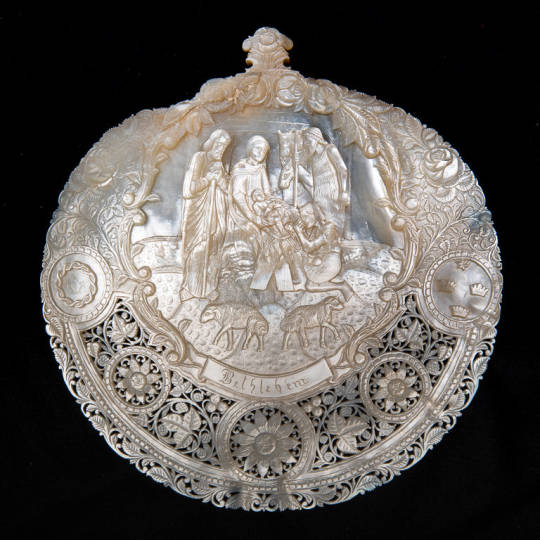

For reference, here's a Bethlehem mother of pearl carving I grabbed quickly from Google, and my necklace. They do indeed, look like very similar if not the same styles
#cipher talk#Funnily enough part of why I like it is because it reminds me of these little mother of pearl charms you sometimes find in Coptic jewelry#Particularly the ones that come to mind for me are from like. The 5th-7th century because I Do History Here#Palestinian art
4 notes
·
View notes
Text

White-ground lekythos
* Athens
* 450 BCE
* British Museum
London, July 2022
#lekythos#5th century BCE#ancient#Greek#art#Attic#vase#Athens#Greek women#jewelry#British Museum#my photo
53 notes
·
View notes
Text
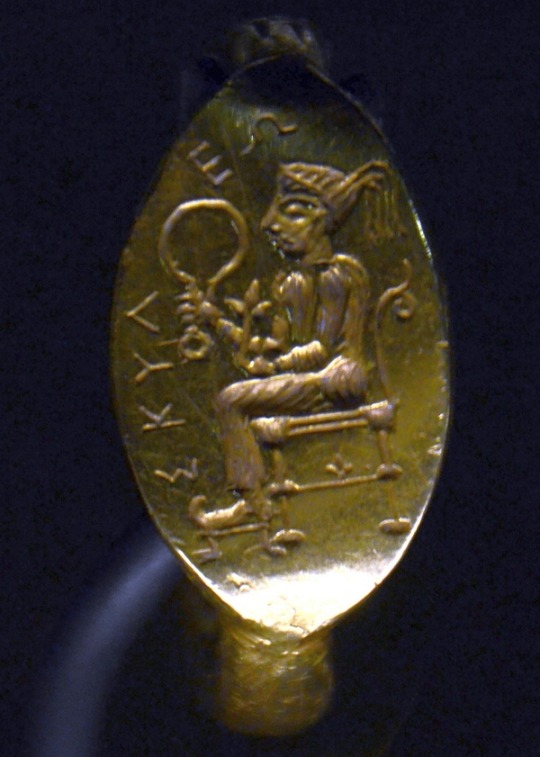
The bezel of the Ring of Scyles 500-400 BCE. National History Museum of Romania.
"Scyles was the heir and son of the king Ariapeithes and a Greek woman from Istria. His mother taught him to read and speak the Greek language, which distinguished him from other Scythians, who were illiterate. Because of his mixed heritage, he was ambivalent toward the culture of his father and displayed many Hellenic traits. For example, he built a large house in Pontic Olbia and married a Greek woman, both unheard of practices because the Scythians were largely nomadic and polygamous. He also publicly took part in Bacchic rites, to the anger of other Scythian chiefs.
According to Herodotus, it was because of these unconventional traits that the Scythians rebelled against Scyles, and he was forced to flee from his homeland. He escaped to the Thracian king Sitalces. However, he was pursued by his brother Octamasadas, who raised an army and marched on Thrace. In the midst of the war between the Scythians and Thracians, it was agreed upon by Sitalces and Octamasedes that Scyles would be given over to his brother, in exchange for the release of Sitalces' brother, who was being held prisoner by the Scythians. Scyles was handed over and executed.
Coins bearing the name of Scyles have been found in Niconium, where it is thought that Scyles was buried.
From Herodotus:
This nation also is very averse to adopting strange customs, rejecting even those of other tribes among themselves, but especially those of the Hellenes, as the history of Anacharsis and also afterwards of Skyles proved. For as to Anacharsis first, when he was returning to the abodes of the Scythians, after having visited many lands and displayed in them much wisdom, as he sailed through the Hellespont he put in to Kyzicos: and since he found the people of Kyzicos celebrating a festival very magnificently in honour of the Mother of the Gods, Anacharsis vowed to the Mother that if he should return safe and sound to his own land, he would both sacrifice to her with the same rites as he saw the men of Kyzicos do, and also hold a night festival. So when he came to Scythia he went down into the region called Hylaia (this is along by the side of the racecourse of Achilles and is quite full, as it happens, of trees of all kinds),—into this, I say, Anacharsis went down, and proceeded to perform all the ceremonies of the festival in honour of the Goddess, with a kettle-drum and with images hung about himself. And one of the Scythians perceived him doing this and declared it to Saulios the king; and the king came himself also, and when he saw Anacharsis doing this, he shot him with an arrow and killed him. Accordingly at the present time if one asks about Anacharsis, the Scythians say that they do not know him, and for this reason, because he went out of his own country to Hellas and adopted foreign customs. And as I heard from Tymnes the steward of Ariapeithes, he was the uncle on the father's side of Idanthyrsos king of the Scythians, and the son of Gnuros, the son of Lycos, the son of Spargapeithes. If then Anacharsis was of this house, let him know that he died by the hand of his brother, for Idanthyrsos was the son of Saulios, and Saulios was he who killed Anacharsis.
However I have heard also another story, told by the Peloponnesians, that Anacharsis was sent out by the king of the Scythians, and so made himself a disciple of Hellas; and that when he returned back he said to him that had sent him forth, that the Hellenes were all busied about every kind of cleverness except the Lacedemonians; but these alone knew how to exchange speech sensibly. This story however has been invented without any ground by the Hellenes themselves; and however that may be, the man was slain in the way that was related above.
This man then fared thus badly by reason of foreign customs and communication with Hellenes; and very many years afterwards Skyles the son of Ariapeithes suffered nearly the same fate as he. For Ariapeithes the king of the Scythians with other sons had Skyles born to him: and he was born of a woman who was of Istria, and certainly not a native of Scythia; and this mother taught him the language and letters of Hellas. Afterwards in course of time Ariapeithes was brought to his end by treachery at the hands of Spargapeithes the king of the Agathyrsians, and Skyles succeeded to the kingdom; and he took not only that but also the wife of his father, whose name was Opoia: this Opoia was a native Scythian and from her was born Oricos to Ariapeithes. Now when Skyles was king of the Scythians, he was by no means satisfied with the Scythian manner of life, but was much more inclined towards Hellenic ways because of the training with which he had been brought up, and he used to do somewhat as follows:—When he came with the Scythians in arms to the city of the Borysthenites (now these Borysthenites say that they are of Miletos),—when Skyles came to these, he would leave his band in the suburbs of the city and go himself within the walls and close the gates. After that he would lay aside his Scythian equipments and take Hellenic garments, and wearing them he would go about in the market-place with no guards or any other man accompanying him (and they watched the gates meanwhile, that none of the Scythians might see him wearing this dress): and while in other respects too he adopted Hellenic manners of life, he used also to perform worship to the Gods according to the customs of the Hellenes. Then having stayed a month or more than that, he would put on the Scythian dress and depart. This he did many times, and he both built for himself a house in Borysthenes and also took to it a woman of the place as his wife.
Since however it was fated that evil should happen to him, it happened by an occasion of this kind:—he formed a desire to be initiated in the rites of Bacchus-Dionysos, and as he was just about to receive the initiation, there happened a very great portent. He had in the city of the Borysthenites a house of great size and built with large expense, of which also I made mention a little before this, and round it were placed sphinxes and griffins of white stone: on this house Zeus caused a bolt to fall; and the house was altogether burnt down, but Skyles none the less for this completed his initiation. Now the Scythians make the rites of Bacchus a reproach against the Hellenes, for they say that it is not fitting to invent a God like this, who impels men to frenzy. So when Skyles had been initiated into the rites of Bacchus, one of the Borysthenites went off to the Scythians and said: "Whereas ye laugh at us, O Scythians, because we perform the rite of Bacchus and because the God seizes us, now this divinity has seized also your king; and he is both joining in the rite of Bacchus and maddened by the influence of the God. And if ye disbelieve me, follow and I will show you." The chief men of the Scythians followed him, and the Borysthenite led them secretly into the town and set them upon a tower. So when Skyles passed by with the company of revellers, and the Scythians saw him joining in the rite of Bacchus, they were exceedingly grieved at it, and they went out and declared to the whole band that which they had seen.
After this when Skyles was riding out again to his own abode, the Scythians took his brother Octamasades for their leader, who was a son of the daughter of Teres, and made insurrection against Skyles. He then when he perceived that which was being done to his hurt and for what reason it was being done, fled for refuge to Thrace; and Octamasades being informed of this, proceeded to march upon Thrace. So when he had arrived at the river Ister, the Thracians met him; and as they were about to engage battle, Sitalkes sent a messenger to Octamasades and said: "Why must we make trial of one another in fight? Thou art my sister's son and thou hast in thy power my brother. Do thou give him back to me, and I will deliver to thee thy brother Skyles: and let us not either of us set our armies in peril, either thou or I." Thus Sitalkes proposed to him by a herald; for there was with Octamasades a brother of Sitalkes, who had gone into exile for fear of him. And Octamasades agreed to this, and by giving up his own mother's brother to Sitalkes he received his brother Skyles in exchange: and Sitalkes when he received his brother led him away as a prisoner, but Octamasades cut off the head of Skyles there upon the spot. Thus do the Scythians carefully guard their own customary observances, and such are the penalties which they inflict upon those who acquire foreign customs besides their own."
-taken from wikipedia and The Histories by Herodotus (Book 4.76 - 4.80)
#scythian#ancient greek#antiquities#literature#history#ancient jewelry#scythian gold#ancient history#pagan#paganism#dionysos#5th century bce#herodotus
18 notes
·
View notes
Text
Oldest reference to Norse god Odin found in Danish treasure
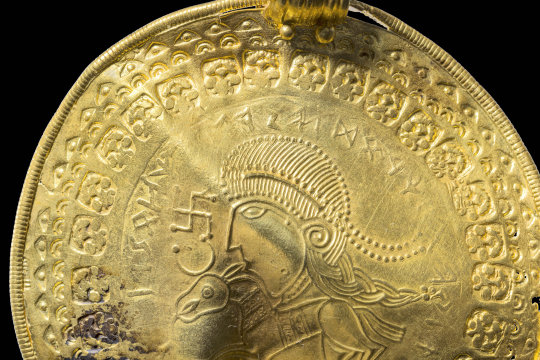
Scandinavian scientists said Wednesday that they have identified the oldest-known inscription referencing the Norse god Odin on part of a gold disc unearthed in western Denmark in 2020.
Lisbeth Imer, a runologist with the National Museum in Copenhagen, said the inscription represented the first solid evidence of Odin being worshipped as early as the 5th century—at least 150 years earlier than the previous oldest known reference, which was on a brooch found in southern Germany and dated to the second half of the 6th century.
The disc discovered in Denmark was part of a trove containing about a kilogram (2.2 pounds) of gold, including large medallions the size of saucers and Roman coins made into jewelry. It was unearthed in the village of Vindelev, central Jutland, and dubbed the Vindelev Hoard. Read more.
874 notes
·
View notes
Text
COPENHAGEN, Denmark (March 8th 2023) — Scandinavian scientists said Wednesday that they have identified the oldest-known inscription referencing the Norse god Odin on part of a gold disc unearthed in western Denmark in 2020.
Lisbeth Imer, a runologist with the National Museum in Copenhagen, said the inscription represented the first solid evidence of Odin being worshipped as early as the 5th century, or at least 150 years earlier than the previous oldest known reference — on a brooch found in southern Germany and dated to the second half of the 6th century.
The disc discovered in Denmark was part of a trove containing about a kilogram (2.2 pounds) of gold, including large medallions the size of saucers and Roman coins made into jewelry. It was unearthed in the village of Vindelev, central Jutland, and dubbed the Vindelev Hoard.
Experts think the cache was buried 1,500 years ago, either to hide it from enemies or as a tribute to appease the gods. A golden bracteate, a kind of thin, ornamental pendant, which carried an inscription that read, “He is Odin’s man,” likely referring to an unknown king or overlord.
“It’s one of the best executed runic inscriptions that I have ever seen,” Imer said. Runes are symbols that early tribes in northern Europe used to communicate in writing.
Odin was one of the main gods in Norse mythology and was frequently associated with war as well as poetry.
More than 1,000 bracteates have been found in northern Europe, according to the National Museum in Copenhagen, where the trove discovered in 2020 is on display.
Krister Vasshus, an ancient language specialist, said that because runic inscriptions are rare, “every runic inscription (is) vital to how we understand the past.”
“When an inscription of this length appears, that in itself is amazing,” Vasshus said. “It gives us some quite interesting information about religion in the past, which also tells us something about society in the past.”
During the Viking Age, considered to be from 793 to 1066, Norsemen known as Vikings undertook large-scale raiding, colonizing, conquest and trading throughout Europe. They also reached North America.
The Norsemen worshipped many gods and each of them had various characteristics, weaknesses and attributes. Based on sagas and some rune stones, details have emerged that the gods possessed many human traits and could behave like humans.
“That kind of mythology can take us further and have us reinvestigate all the other 200 bracteate inscriptions that we know,” Imer said.
#asatru#new lore just dropped!#archaeology#odin#norse mythology#this is one of those rare things i've known about for months but due to NDAs!!!
247 notes
·
View notes
Text

Ostrogothic jewelry uncovered in San Marino, 5th-6th century AD
from The British Museum
561 notes
·
View notes
Text
I have an entire word document on Harry meeting Locket!Tom that I don't know whether I'll use so I’ll share that scene in here. Spoiler alert for nynn 5th Year I guess. P.S. locket Tom is aware of who Harry is, so he will just go big and go for it, but he'll also be "Me? I'm innocent!" while internally he is the evillest motherfucker of the Horcrux Bunch.
-----------------
“May I help you?” asked a smooth, masculine voice, brushing the threads of Harry’s hair, making the hairs on her nape prickle, standing on end. Momentarily, Harry freezes in fear, noticing something familiar in the lilt, something matured yet vaguely noticeable.
Slowly, Harry turned around.
Tom Riddle stands behind her. Taller than his sixteen-year-old self, inky hair pristine and proper, combed back, inky strands reaching to his earlobes and down his nape, high cheekbones, rosy lips set in a saccharine smile, pristine porcelain skin, he is the most handsome she has seen him thus far. The mid-length hair flatters his prince charming appearance even more.
The first thought Harry manages to think through the blood-curdling terror rushing through her veins is: Fuck.
The next thought she manages is: Don’t look him in the eyes. The third is: Don’t scream.
“Sorry,” said Harry quickly, putting on her own facade (because two can play this game) of a polite, timid girl, keeping her gaze on his neck and chin. “I think I’m lost. I wasn’t supposed to be here.”
Understatement of the century.
Tom stepped closer. Far too close to be appropriate.
“People rarely come here accidentally,” he said politely, while Harry restrained every urge to shove him away from herself, the scent of his soft cologne sweeping over her, an intoxicating aroma luring prey closer. “This is not the sort of shop one enters without looking for something. Something they can’t acquire in the regular shops in Diagon Alley.”
“Er,” trailed Harry, trying to find some believable excuse. What shop was this? The thought of Lord Voldemort, Tom Riddle, the model student, working at a back alley shop, was the farthest thing Harry imagined he would be doing after graduating Hogwarts.
One thing was for sure. She wanted his attention off her. Far away from her. It was never pleasant to be the center of Tom’s attention.
“What sorts of objects do you sell here?”
“We sell all sorts of objects.”
“Mm...” Harry said, using that little opportunity of space to step away from him, hiding the fact she was fleeing by pretending to survey the shelves. There was a crystal ball swirling red mist, and Harry wondered if it was a Remembrall or something much more sinister. There were, as Tom said, all sorts of objects on display. Weapons, objects, chests, spheres of materials, even hands that looked to have been severed. There were a few skulls; she didn’t want to know whether they were fake or real.
“Is this real?” she asked, gazing upon a jar of smaller human skulls.
“Everything we have is real.”
Harry wisely stepped back from the shelf hosting the numerous skulls.
She blushes easily. How sweet. Oh, he just wants to eat her up. Wants to feel the heat he brings to her cheeks under his palms, wants to make them scalding hot to the touch. Wants to make them burn feverishly.
“We have an assortment of lovely jewelry if you’d like any,” he said, buttery soft.
Instantly, Harry was on guard. This Tom was not really alive. Just as the Tom from the diary, this must be the Tom from the locket.
“I don’t wear jewerly,”
I’ll shower you in gifts.
“That's a shame,” he says sincerely. “How so?”
Harry shrugged. “Never got around to it.”
“Well, then...” Tom muses, a wicked, delighted glint in his dark eyes. “I suppose we’ll have to find you something remarkable to introduce you to the idea. I find that remarkable objects make for remarkable possessions. The more special something is, the more a person craves it. And it is only the truly worthy ones that are offered the honour.”
“The ones with money,” said Harry sadly. How many times did she wish to buy Mrs Weasley and Ginny nice jewelry? Or Ron a new broom?
“No,” said Tom. “I said worthy. Those deserving. Not those who have the means to buy it, but those who earn it.”
“And what about inherited jewelry? You know, passed down in the family? Is that considered earned, too?”
“Of course," said Tom, sounding pleased. “I would argue that is the highest level of worth a piece of jewelry can have. To be passed down in the family. Whether father to son, or mother to daughter.”
“And mother to son, or father to daughter,” said Harry, thinking of the Invisibility Cloak her father left her, thinking of her mum's protection in her blood and the money in Gringotts vault, making sure Harry would never be hungry.
Tom paused for a moment, turning silent.
“Yes,” he whispered after a moment.
115 notes
·
View notes
Text

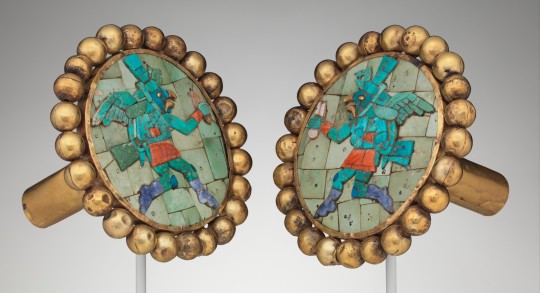
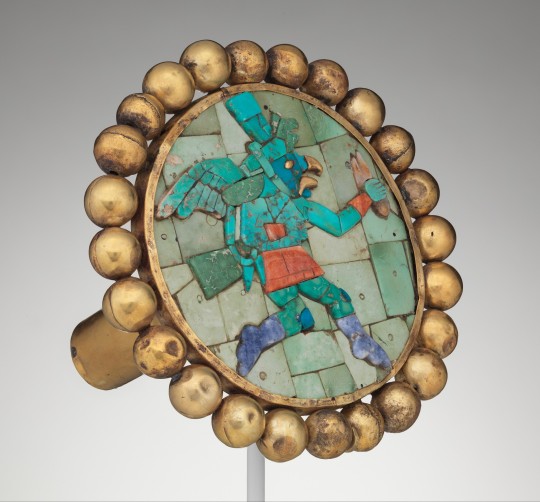
~ Ear Ornament, Winged Runner.
Date: A.D. 400–700
Place of origin: : Perú, North Coast
Culture: Moche
Medium: Gold, turquoise, sodalite, shell.
#ancient#ancient art#history#museum#archeology#ancient history#archaeology#5th century#8th century#jewelry#ear Ornament#winged runner#perú#peruvian#moche#mosaic#gold#turquoise#shell#a.d. 400#a.d. 700
880 notes
·
View notes
Text
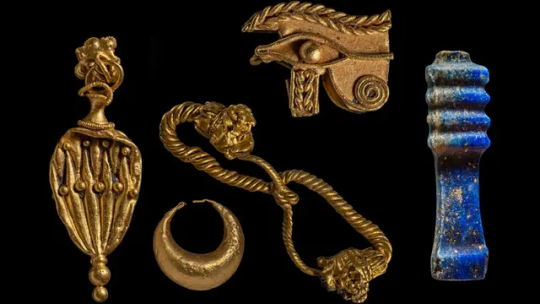
Sunken Temples of Aphrodite and Amun Found off Egyptian Coast
New discoveries off Egyptian coast reveal ‘treasures and secrets
New “treasures and secrets” have been revealed at the site of a sunken temple off Egypt’s Mediterranean coast, the European Institute for Underwater Archaeology (IEASM) announced in a news release Tuesday.
An underwater archaeological team, led by French marine archaeologist Franck Goddio, has made further discoveries at the site of a temple to god Amun in the ancient port city of Thonis-Heracleion in the Bay of Aboukir, the institute said.
The team investigated the city’s south canal, where huge blocks of stone from the ancient temple collapsed “during a cataclysmic event dated to the mid-second century BC,” the institute said.
The temple to god Amun was where pharaohs came “to receive the titles of their power as universal kings from the supreme god of the ancient Egyptian pantheon,” it said.
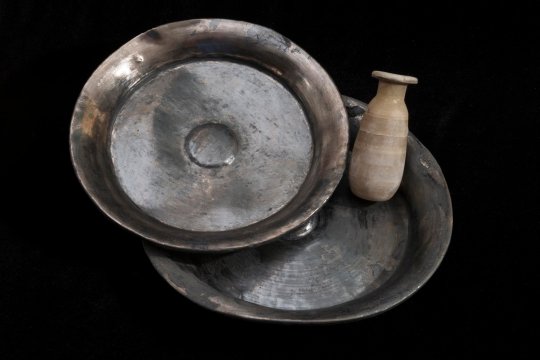
“Precious objects belonging to the temple treasury have been unearthed, such as silver ritual instruments, gold jewelry and fragile alabaster containers for perfumes or unguents,” IEASM said. “They bear witness to the wealth of this sanctuary and the piety of the former inhabitants of the port city.”
The archaeological excavations, conducted jointly by Goddio’s team and the Department of Underwater Archaeology of the Ministry of Tourism and Antiquities of Egypt, revealed underground structures “supported by very well-preserved wooden posts and beams dating from the 5th century BC,” the institute said.
“It is extremely moving to discover such delicate objects, which survived intact despite the violence and magnitude of the cataclysm,” said Goddio, who is president of IEASM and director of excavations.
The discoveries were made possible thanks to the development and use of new geophysical prospecting technologies that can detect cavities and objects “buried under layers of clay several meters thick,” the institute said.


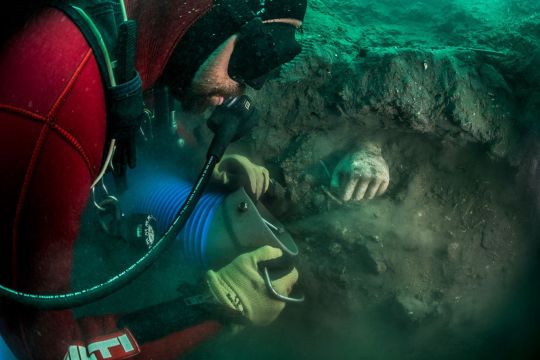
Relics from Greek presence, too
East of the Amun temple, a Greek sanctuary devoted to Aphrodite was discovered containing bronze and ceramic objects.
“This illustrates that Greeks who were allowed to trade and settle in the city during the time of the Pharaohs of the Saïte dynasty (664 - 525 BC) had their sanctuaries to their own gods,” the institute said.
The discoveries of Greek weapons also reveal the presence of Greek mercenaries in the area, IEASM said. “They were defending the access to the Kingdom at the mouth of the Canopic Branch of the Nile. This branch was the largest and the best navigable one in antiquity.”
The remains of Thonis-Heracleion are now located under the sea, 7 kilometers (4.3 miles) from the present coast of Egypt, IEASM said. The city was for centuries Egypt’s largest port on the Mediterranean before the founding of Alexandria by Alexander the Great in 331 BC.
“Rising sea levels and earthquakes followed by tidal waves triggering land liquefaction events, caused a 110 square kilometer portion of the Nile delta to totally disappear under the sea, taking with it the city of Thonis-Heracleion,” the institute said.
The city was discovered by the IEASM in 2000.
By Radina Gigova.
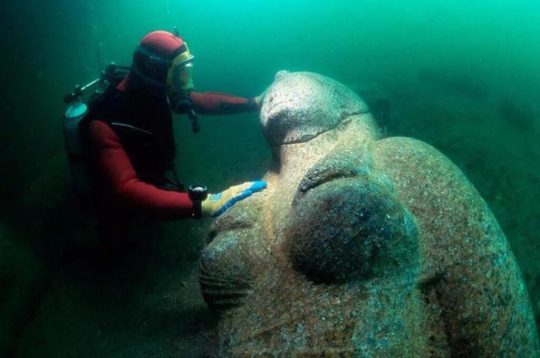
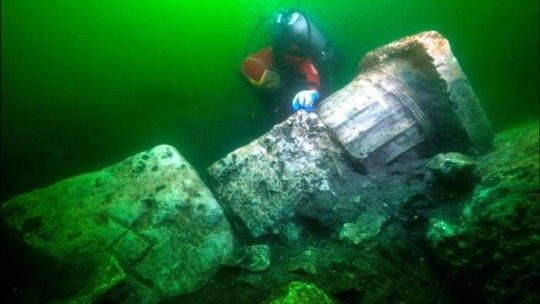

#Sunken Temples of Aphrodite and Amun Found off Egyptian Coast#Thonis-Heracleion#Bay of Aboukir#gold#gold treasure#ancient artifacts#archeology#archeolgst#history#history news#ancient history#ancient culture#ancient civilizations#ancient egypt#egyptian history#egyptian mythology#greek history
278 notes
·
View notes
Note
Can you tell us more about who England refers too as mother? And did you divide the UK siblings roughly into two pairs because of Roman Britain? I'm sorry you just keep dropping hints and no one else has asked 💌
Oh lord, okay. So disclaimer, working with prehistory is a fucking crap shoot. Archaeology has a lot of interpretations and not as many facts as historians and archivists like me, especially who studied modern history, would like. And even when history does come to the islands in the form of the Roman writers, that is also largely questionable because propaganda is as old as human communication. So I try to work with what we do know, but before a certain point, I'm basically writing fantasy. But also, no one has to work with history ever in a fucking stupid anime fandom. I'm just a diagnosed anxious headcase who copes with the uncertainty of existence by researching the fuck out of every choice I've ever made sober, including this shitshow of a blog and predecessors. Most of my focus is on much later history, so I'm taking a minimalist approach here and making as little work for myself as possible while at least taking some guidance from history to fit the themes I like so none of this is likely going to be the best take, tbh. That said, onwards into the breach, I fucken guess.
Can you tell us more about who England refers to as mother?
Yes. So most of the time, the conglomerate characters of "Germania" or the fanon "Native America," where dozens and hundreds and thousands of politically interlocked or entirely separate cultures are smushed into one character, make zero sense to me. In the case of Native America, it's downright racist, and in the case of Germania it's basically sucking Tacitus off 2,000 years after the fact. But Brittania could make sense. Being an island separated from mainland Europe made for some attractive socio-political and cultural unity hinted at in writing after the Roman invasion and before the fact in the archaeological record. But how long before the Romans? Where do I begin with Brittania, eh? The Red Lady of Paviland? The Creswell Crags? The Starr Mesolithic Site? Neolithic Chambered Tomb-Shrines? Stonehenge? The Iron Age Hillforts? Ah! There we go, the Celtic arrival in Britain. i.e. the option that makes me do the least work to get the job done. The Celts arrive in Britain about 1,300-800 BCE and in Ireland about 800-500 BCE depending on who you read. There is one tribe among the Celtic that had strong links to Britain and Ireland. The Brigantes were stuck in the border region between what is today Scotland and England, with at least some sort of material connections in Wales and Ireland. So my shortcut to a decent storyline that had some basis in fact, was to have her people interpret her as their patron goddess of Brigantia and link her tightly to Celtic paganism and weakened by the invasions of Rome but also the widespread adoption of Christianity in the 5th century. She was a proud woman who enjoyed the worship she once knew and who loved her children fiercely. She was every bit a Cartimandua or Boudicca. And when Christ and his nails bled her to death, her sons eventually dug her a barrow at the foot of an iron age hillfort, and her only daughter braided her hair and placed her golden jewelry on her one last time and their world was never the same.
And did you divide the UK siblings roughly into two pairs because of Roman Britain?
Yes and no. The Romans did take and hold England and Wales but Wales was much harder to hold onto. Under the Romans, life didn't change there or in Scotland nearly as much as in England. My main reason for splitting them into Brighid and Alasdair and Rhys and Arthur beyond much more modern politics is linguistic. Scottish Gaelic is much more related to Irish than it is to Welsh. And the Welsh word Cymru once referred to both the Welsh and Cumbrians. Now Cumbrian is a fascinating little language that is now dead, but it left a fantastic legacy in its counting system. @oumaheroes headcanons it as being something he uses to refer to his weans, and I, sobbing, concur wholeheartedly. I also have made random references to a shitfaced Arthur babbling in Cumbrian. So with that being a Celtic language in what is today England, et voila, two pairs.
#Britannia and her children || they made a desert and called it peace#the ask box || probis pateo#Alasdair || my heart's in the highlands#Arthur || stone set in the silver sea#Brighid || an bearna bhaoil#Rhys || my word for heaven was not yours
66 notes
·
View notes
Text
Scandinavian scientists said Wednesday that they have identified the oldest-known inscription referencing the Norse god Odin on part of a gold disc unearthed in western Denmark in 2020.
Lisbeth Imer, a runologist with the National Museum in Copenhagen, said the inscription represented the first solid evidence of Odin being worshipped as early as the 5th century—at least 150 years earlier than the previous oldest known reference, which was on a brooch found in southern Germany and dated to the second half of the 6th century.
The disc discovered in Denmark was part of a trove containing about a kilogram (2.2 pounds) of gold, including large medallions the size of saucers and Roman coins made into jewelry. It was unearthed in the village of Vindelev, central Jutland, and dubbed the Vindelev Hoard.
Experts think the cache was buried 1,500 years ago, either to hide it from enemies or as a tribute to appease the gods. A golden bracteate—a kind of thin, ornamental pendant—carried an inscription that read, "He is Odin's man," likely referring to an unknown king or overlord.
"It's one of the best executed runic inscriptions that I have ever seen," Imer said.
Of course they released the news on a Wednesday.
78 notes
·
View notes
Photo
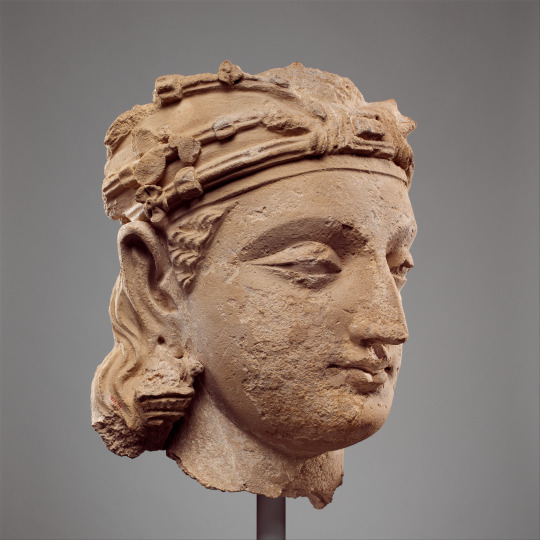
Monumental Bodhisattva Head, 5th century
Pakistan (ancient region of Gandhara)
Stucco
H. 19 3/4 in. (50.2 cm); W. 10 in. (25.4 cm); D. 10 in. (25.4 cm)
This head comes from a sculpture that would have been more than twelve feet tall and likely stood along the perimeter of a Buddhist sacred area enclosing a stupa. By the fourth and fifth centuries monumental imagery became increasingly popular in Gandhara and was almost exclusively restricted to images of the Buddha. The bodhisattva’s turban and jewelry might indicate that he is a rare image of Shakyamuni prior to enlightenment. Alternatively, the bodhisattva may have attended the Buddha as part of a massive triad.
Collection of the Metropolitan Museum of Art
#stucco#sculpture#Pakistan#Gandhara#Buddhism#bodhisattva#figure#cultural amalgam#5th century#art#art history#The Met#Metropolitan Museum of Art
16 notes
·
View notes
Text
Merci! Thank You !
ׂ╰┈➤ your boyfriend finds you dear to him, so how does he show it?
ׂ╰┈➤⋆.ೃ࿔*:・Mercutio/Tybalt x G/N! Reader (Headcanons) ╭──╯ . . . .
(A/N: This was the quickest set of HCS I’ve ever done WOW. Anyways, please enjoy this, and if you have any requests, do send me an ask!)


(DIVIDER CRED: UNKNOWN)
Mercutio Escalus:
My, my, you got the party lover’s heart? Well, aren’t you the charmer?
You two have been dating for five years, but it feels like a century, to him at least. Not like he’s always mentioned that to you.
Today marks your 5th year anniversary, and normally, you were expecting a party of sorts. Maybe even going to a club and drinking until you blackout. I mean, that IS his thing, right? He’s literally a night owl for parties.
So, you out on your best clubbing outfit, but saw Mercutio sitting on a sofa, dreads in a ponytail, and him smiling at you…in navy blue sweatpants and an oversized, short-sleeved shirt…with snacks, your favorite drinks, your favorite film, some blankets, and…wait, what?
You looked confused, and shocked, at your boyfriend, but all he did was pat his lap and held a blanket.
“Merci…what are you doing..?” “What’s it look like I’m doing, cutie?”, he outreaches his arms, wiggling his fingers. You walked over to him, and sat down on his lap, “I thought we were gonna party, like we usually do?” “Yeah, well, partying isn’t everything, especially not on a night like this.”
“Well, what are we gonna do tonight?” “Simple. We’re gonna watch TV, eat, and celebrate our anniversary together alone. Just me, you”, he leans in, his lips touching yours slightly, “and our sweet, sweet, 5th anniversary.” You giggled, and leaned in to complete his kiss.
And, for once, you were glad you didn’t go out. You were glad that you stayed home. You were glad that you two cuddled all night, with a few kisses in between.
You weren’t expecting this, but you wouldn’t have wanted it any differently.
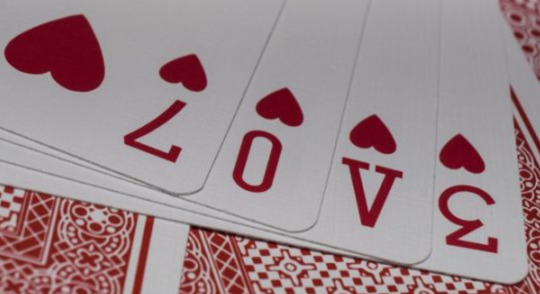

(DIVIDER CRED: @/PLUTISM ON TUMBLR)
Tybalt Capulet:
You got TYBALT CAPULET to DATE you?? Are you Cupid’s favorite???
Look, his heart may not be the easiest to capture, but trust and BELIEVE that it’s worth it when you do.
As the notorious “Prince of Cats”, he’s mainly busy trying to handle things related to the mafia��and his family, so it’s not often you get to see him, especially in the best of moods.
And, you still try to help him relax regardless, since you don’t treat him like some money generator, and he’s taken notice of that. All of that, actually. He’s been noticing for 6 years.
So, imagine you waking up to beautiful jewelry, new shoes, or even a stack of money at the foot of your bed.
“Mmm…”, you gently shake your head, and notice that the other side of the bed is empty…again, but as you get up fully, you notice something at the end of your bed. It was (a piece of jewelry/some new clothes/a stack of money/ your gift of choice) with a little card on the side. You crawled to the card, and picked it up, as it read:
“‘Hey doll, you were still asleep when I got here, so I just wanted to give you a gift before I go. Sorry that I couldn’t be here, but Fulgenicio called me in and said that I had to help cover for Petrucchio. Nonetheless, happy anniversary.’ -Tybalt”.
You smiled softly, before smelling food downstairs. You brushed your teeth, washed your face, and went downstairs, seeing your boyfriend downstairs, cooking…for you.
He turned to you, smiling, and gave you a kiss, before putting your food on a plate, and you two eating together. You two talked all day, and spent the whole day together. Needless to say, no matter what Fulgenicio, or his family needed, it would have to wait. His doll, and this precious day, comes first before anything.
Besides, he couldn’t resist the sparkle in your eyes when he told you that he was going to stay the whole day.
#romeo + juliet 1996#tybalt capulet#tybalt 1996#romeo and juliet 1996#romeo and juliet#mercutio 1996#mercutio escalus 1996#tybalt x reader 1996#tybalt x reader#Mercutio x reader 1996#Mercutio x reader#Baaler fics
2 notes
·
View notes